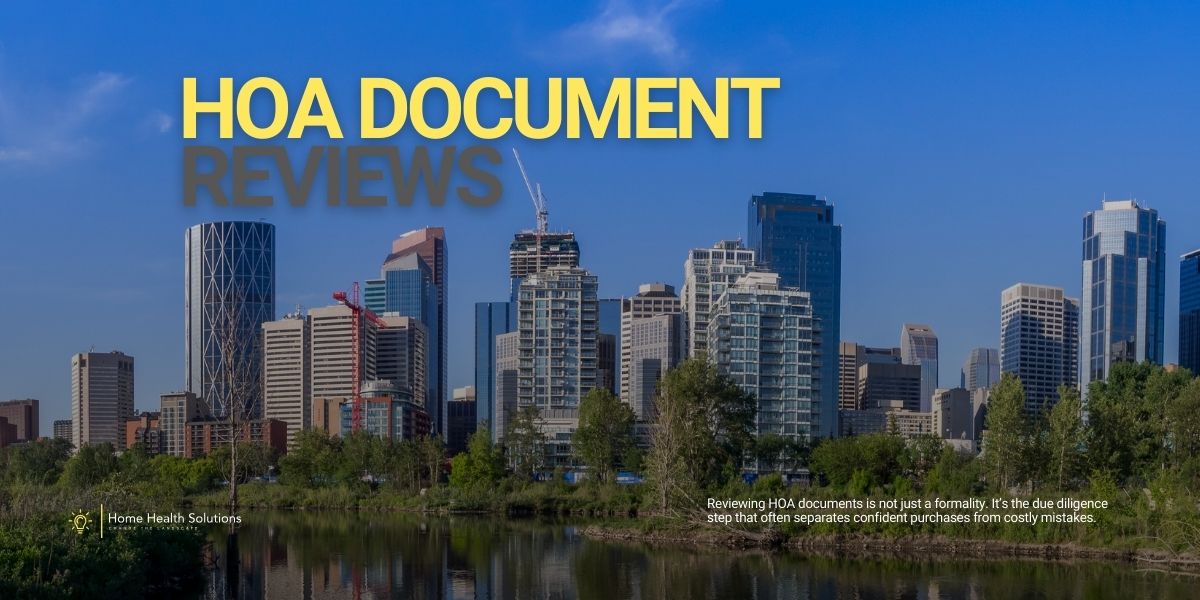
What Is an HOA and What Docs Are Required?
A Homeowners Association (HOA) is a legal entity that governs certain residential communities, including condos, townhomes, and detached homes in planned developments. These organizations may go by various names in Canada, particularly in provinces like Ontario, Alberta, and British Columbia, such as strata corporations, condo boards, or property owners associations, but they all serve the same purpose of regulating, upholding, and enforcing laws in the community's best interests.
Canadian Requirements for HOA Documents
When you’re purchasing into an HOA-governed community, these are the key documents you (or your lawyer) should receive:
Document | Description |
|---|---|
Declaration / CC&Rs (Covenants, Conditions & Restrictions) | Outlines legal use of the property and all rules applied by the HOA |
Bylaws | Defines board powers, election process, and internal operations |
Operating Budget | Provides insight into financial health and reserve allocations |
Reserve Fund Study / Status Certificate | Shows long-term capital planning for major repairs |
Meeting Minutes (AGM, Special Meetings) | Reveals current issues, project updates, and owner concerns |
Insurance Summary | Critical to assess what is and isn’t covered by the HOA master policy |
Rules and Regulations | Additional rules beyond CC&Rs, often related to pets, parking, noise, etc. |
👉 In Alberta, this information is protected under the Condominium Property Act and must be disclosed upon request during a real estate transaction.
👉 In Ontario, the Status Certificate must be delivered within 10 days of a written request under the Condominium Act, 1998.
How to Spot Red Flags in CC&Rs, Budgets, and Meeting Minutes
Reviewing HOA documents is not just a formality. It’s the due diligence step that often separates confident purchases from costly mistakes.
🚩 Common Red Flags to Watch For
Red Flag | What It Means |
|---|---|
Pending Special Assessments | The HOA is planning to charge extra fees for major repairs |
Underfunded Reserve Fund | Future repairs may not be financially supported |
Frequent Board Turnover or Disputes | Governance instability and poor transparency |
Noise Complaints or Legal Actions | Indicates unhappy ownership or lack of enforcement |
Insurance Deductibles Passed to Owners | Risk of massive personal liability for damages |
Bylaw Restrictions on Rentals | Can affect investor strategy or exit options |
Reading through these hundreds of pages requires both legal knowledge and real estate context. That’s where a third-party review service adds immense value.
Our Review Process for HOA Purchases
We serve as your watchdog and translator, combining financial and legal jargon into a concise, useful synopsis.
What We Provide:
📄 Plain-Language Summary Report – 5 to 7 pages summarizing 100+ pages of documents
🧭 Risk Analysis – Scored risk indicators based on financial, operational, and legal benchmarks
🛡️ Legal & Insurance Insight – Highlighting gaps in coverage, deductibles, and responsibilities
🏘️ Ownership Concerns—Including pets, parking, subletting, fees, and restrictions
📈 Board History Review – Extracting key notes from board minutes to forecast building behaviour
🔗 Quick Reference Links – Organized links to all files for your records or legal counsel
Whether you’re a first-time buyer, investor, or real estate agent, our goal is to deliver clarity before contract.
Our Service Model:
Flat-rate pricing—no hourly surprises.
Subscriptions Available for Realtors & Brokers
Rush options – Because deals move fast.
National coverage – HOA and strata document reviews across all Canadian provinces.
Don’t Sign Before You Review
In a competitive housing market, it’s easy to skip steps. But HOA documents are not optional reading—they are your protection against surprise costs and legal headaches.
Before you close the deal, protect your investment.